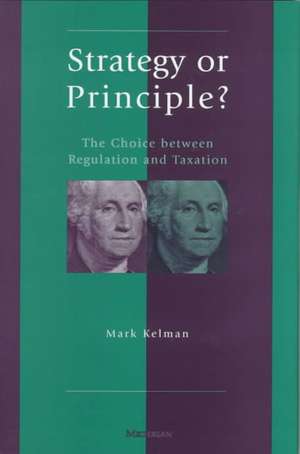Strategy or Principle?: The Choice Between Regulation and Taxation
Autor Mark Gregory Kelmanen Limba Engleză Hardback – 2 dec 1999
Governments may choose to meet perceived social problems either through regulatory mandates or the public provision of a good that is funded by broad-based taxes. Contrary to an emerging conservative consensus in the "property rights" movement, Strategy or Principle? argues, first, that the constitution permits broad use of regulations and, second, that the use of regulation may be the better policy choice.
Strategy or Principle? addresses a critical issue in law, public administration, and public finance: When is it both prudent and constitutionally permissible to meet social aims by requiring that private parties take certain steps to meet that aim? Alternately, when is it appropriate for the government to use the money it raises through general taxation to fund programs that meet these aims?
Regulations have been criticized in "property rights" literature on the grounds that it violates the constitution by limiting the ability of property owners to use their property without compensation. These theorists argue that the government must directly fund these programs. Kelman argues for regulations and "regulatory taxes" in some situations. However, he criticizes an undue reliance among certain political progressives on regulation, arguing that the allocation of social benefits may be irrational if those who are benefited by regulation are thought to have some sort of moral priority to the money implicitly spent on improving their condition over those who receive funds through tax-and-spend programs.
Strategy or Principle? will be of interest to students and scholars of constitutional law, public finance, political science, and legislation and administration.
Mark Kelman is William Nelson Cromwell Professor of Law, Stanford University Law School.
Strategy or Principle? addresses a critical issue in law, public administration, and public finance: When is it both prudent and constitutionally permissible to meet social aims by requiring that private parties take certain steps to meet that aim? Alternately, when is it appropriate for the government to use the money it raises through general taxation to fund programs that meet these aims?
Regulations have been criticized in "property rights" literature on the grounds that it violates the constitution by limiting the ability of property owners to use their property without compensation. These theorists argue that the government must directly fund these programs. Kelman argues for regulations and "regulatory taxes" in some situations. However, he criticizes an undue reliance among certain political progressives on regulation, arguing that the allocation of social benefits may be irrational if those who are benefited by regulation are thought to have some sort of moral priority to the money implicitly spent on improving their condition over those who receive funds through tax-and-spend programs.
Strategy or Principle? will be of interest to students and scholars of constitutional law, public finance, political science, and legislation and administration.
Mark Kelman is William Nelson Cromwell Professor of Law, Stanford University Law School.
Preț: 449.19 lei
Preț vechi: 554.56 lei
-19% Nou
Puncte Express: 674
Preț estimativ în valută:
85.96€ • 91.91$ • 71.67£
85.96€ • 91.91$ • 71.67£
Carte indisponibilă temporar
Doresc să fiu notificat când acest titlu va fi disponibil:
Se trimite...
Preluare comenzi: 021 569.72.76
Specificații
ISBN-13: 9780472110476
ISBN-10: 0472110470
Pagini: 144
Dimensiuni: 152 x 229 x 23 mm
Greutate: 0.36 kg
Ediția:First Edition
Editura: UNIVERSITY OF MICHIGAN PRESS
Colecția University of Michigan Press
ISBN-10: 0472110470
Pagini: 144
Dimensiuni: 152 x 229 x 23 mm
Greutate: 0.36 kg
Ediția:First Edition
Editura: UNIVERSITY OF MICHIGAN PRESS
Colecția University of Michigan Press
Notă biografică
Mark Kelman is William Nelson Cromwell Professor of Law, Stanford University Law School.
Descriere
Should governments use regulations to force private parties to provide public goods or should taxes support the direct provision of public services?
